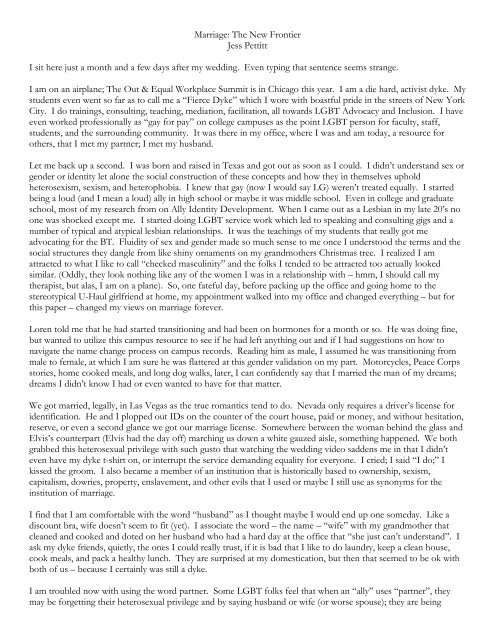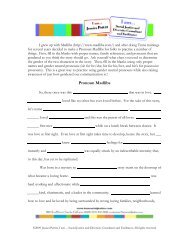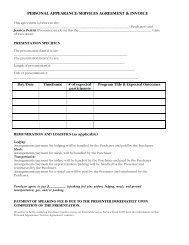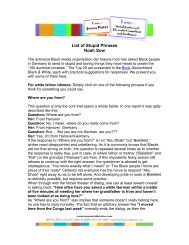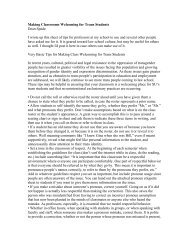Marriage: The new frontier - Jessica Pettitt
Marriage: The new frontier - Jessica Pettitt
Marriage: The new frontier - Jessica Pettitt
You also want an ePaper? Increase the reach of your titles
YUMPU automatically turns print PDFs into web optimized ePapers that Google loves.
<strong>Marriage</strong>: <strong>The</strong> New Frontier<br />
Jess <strong>Pettitt</strong><br />
I sit here just a month and a few days after my wedding. Even typing that sentence seems strange.<br />
I am on an airplane; <strong>The</strong> Out & Equal Workplace Summit is in Chicago this year. I am a die hard, activist dyke. My<br />
students even went so far as to call me a “Fierce Dyke” which I wore with boastful pride in the streets of New York<br />
City. I do trainings, consulting, teaching, mediation, facilitation, all towards LGBT Advocacy and Inclusion. I have<br />
even worked professionally as “gay for pay” on college campuses as the point LGBT person for faculty, staff,<br />
students, and the surrounding community. It was there in my office, where I was and am today, a resource for<br />
others, that I met my partner; I met my husband.<br />
Let me back up a second. I was born and raised in Texas and got out as soon as I could. I didn’t understand sex or<br />
gender or identity let alone the social construction of these concepts and how they in themselves uphold<br />
heterosexism, sexism, and heterophobia. I k<strong>new</strong> that gay (now I would say LG) weren’t treated equally. I started<br />
being a loud (and I mean a loud) ally in high school or maybe it was middle school. Even in college and graduate<br />
school, most of my research from on Ally Identity Development. When I came out as a Lesbian in my late 20’s no<br />
one was shocked except me. I started doing LGBT service work which led to speaking and consulting gigs and a<br />
number of typical and atypical lesbian relationships. It was the teachings of my students that really got me<br />
advocating for the BT. Fluidity of sex and gender made so much sense to me once I understood the terms and the<br />
social structures they dangle from like shiny ornaments on my grandmothers Christmas tree. I realized I am<br />
attracted to what I like to call “checked masculinity” and the folks I tended to be attracted too actually looked<br />
similar. (Oddly, they look nothing like any of the women I was in a relationship with – hmm, I should call my<br />
therapist, but alas, I am on a plane). So, one fateful day, before packing up the office and going home to the<br />
stereotypical U-Haul girlfriend at home, my appointment walked into my office and changed everything – but for<br />
this paper – changed my views on marriage forever.<br />
Loren told me that he had started transitioning and had been on hormones for a month or so. He was doing fine,<br />
but wanted to utilize this campus resource to see if he had left anything out and if I had suggestions on how to<br />
navigate the name change process on campus records. Reading him as male, I assumed he was transitioning from<br />
male to female, at which I am sure he was flattered at this gender validation on my part. Motorcycles, Peace Corps<br />
stories, home cooked meals, and long dog walks, later, I can confidently say that I married the man of my dreams;<br />
dreams I didn’t know I had or even wanted to have for that matter.<br />
We got married, legally, in Las Vegas as the true romantics tend to do. Nevada only requires a driver’s license for<br />
identification. He and I plopped out IDs on the counter of the court house, paid or money, and without hesitation,<br />
reserve, or even a second glance we got our marriage license. Somewhere between the woman behind the glass and<br />
Elvis’s counterpart (Elvis had the day off) marching us down a white gauzed aisle, something happened. We both<br />
grabbed this heterosexual privilege with such gusto that watching the wedding video saddens me in that I didn’t<br />
even have my dyke t-shirt on, or interrupt the service demanding equality for everyone. I cried; I said “I do;” I<br />
kissed the groom. I also became a member of an institution that is historically based to ownership, sexism,<br />
capitalism, dowries, property, enslavement, and other evils that I used or maybe I still use as synonyms for the<br />
institution of marriage.<br />
I find that I am comfortable with the word “husband” as I thought maybe I would end up one someday. Like a<br />
discount bra, wife doesn’t seem to fit (yet). I associate the word – the name – “wife” with my grandmother that<br />
cleaned and cooked and doted on her husband who had a hard day at the office that “she just can’t understand”. I<br />
ask my dyke friends, quietly, the ones I could really trust, if it is bad that I like to do laundry, keep a clean house,<br />
cook meals, and pack a healthy lunch. <strong>The</strong>y are surprised at my domestication, but then that seemed to be ok with<br />
both of us – because I certainly was still a dyke.<br />
I am troubled now with using the word partner. Some LGBT folks feel that when an “ally” uses “partner”, they<br />
may be forgetting their heterosexual privilege and by saying husband or wife (or worse spouse); they are being
insensitive. What should I use? I am more comfortable using the words partner and we don’t identify as<br />
heterosexual, but heteroqueer. Is language at my disposal or yours?<br />
Upon the announcement of our marriage or maybe the 48 hour engagement, people were shocked to say the least.<br />
I really thought folks were surprised that we would do something so quickly, spontaneously, as suddenly. What I<br />
am finding out now, is that marriage is the <strong>new</strong> <strong>frontier</strong> of sex and gender politics.<br />
Where his friends and family, and to a large degree he himself, are dealing with gender validation both legally and<br />
socially, I am being deserted – an excommunication of sorts. <strong>The</strong>re was an article recently about butch lesbians<br />
transitioning and its impact of the lesbian community. I hear people talk about when “butch isn’t enough.” One<br />
women even had the audacity to refer to Loren when introduced to the fact that I was dating a transman, that I was<br />
really “just dating a butch who could cut it.” Transitioning, much like being LGBT or queer isn't something<br />
someone would necessarily choose in our society due to homophobia, fear, hate, bias, and other yummy elements<br />
instilled in western culture. It is arduous at best and painstakingly difficult with seemingly insurmountable obstacles.<br />
However, the once labeled lesbian becoming a man isn't deemed as much of a traitor as a Fierce Dyke legally<br />
marrying a man.<br />
Now don’t get me wrong, my partner and I aren’t in some kind of gender pissing contest, all though that might be<br />
fun to watch, I just think it is fascinating that we are dealing with similar things but at different time. He has spent<br />
the better part of a year explaining to his family that he is the same person just not a sister but a brother or an uncle<br />
instead of an aunt, a man instead of a woman. I am still the Fierce Dyke that marched in New York. I would think<br />
it might even be easy to see how legally marrying a transman (that must be recognized in all states) could be an<br />
activist move for marriage equality or better yet, a political loop hole to show how stupid marriage laws are in the<br />
first place. I am not getting this reaction. I am getting jealous guilt thrown my way while my Dyke Card is being<br />
devalued or even invalidated.<br />
If marriage is “only between a man and a woman” wouldn’t it be more inclusive to ask what is meant by “man” or<br />
“woman” than just asking for man and man or woman and woman marriage. <strong>Marriage</strong>, even if you, like me,<br />
disagree with the whole institution, is the fundamental way folks socialized in the west are told they can validate to<br />
themselves, their partner, friends, family, community, church, etc., that “this is the one.” Obviously, this isn’t<br />
inclusive of polyamorous loving couples or polygamists for that matter, but the validation tool exists. Whether we<br />
like to or not, marriage may not just be about tax breaks and insurance coverage, but about love, sacrifice, devotion,<br />
choice, and witness. Do I think everyone deserves the chance to express this – absolutely!<br />
Biography:<br />
Grounded in Social Justice and Diversity, <strong>Jessica</strong> <strong>Pettitt</strong> is a highly interactive, individualized, and flexible speaker,<br />
consultant, trainer, and facilitator focusing on gender and white privilege, specializing in audiences with low<br />
knowledge levels. For more information, visit www.jessicapettitt.com.<br />
<strong>Pettitt</strong>, J. (2007) TransOhio: Bringing Together the Ohio GLBTQI Community, October 2007, 1 (2), 4-5.


